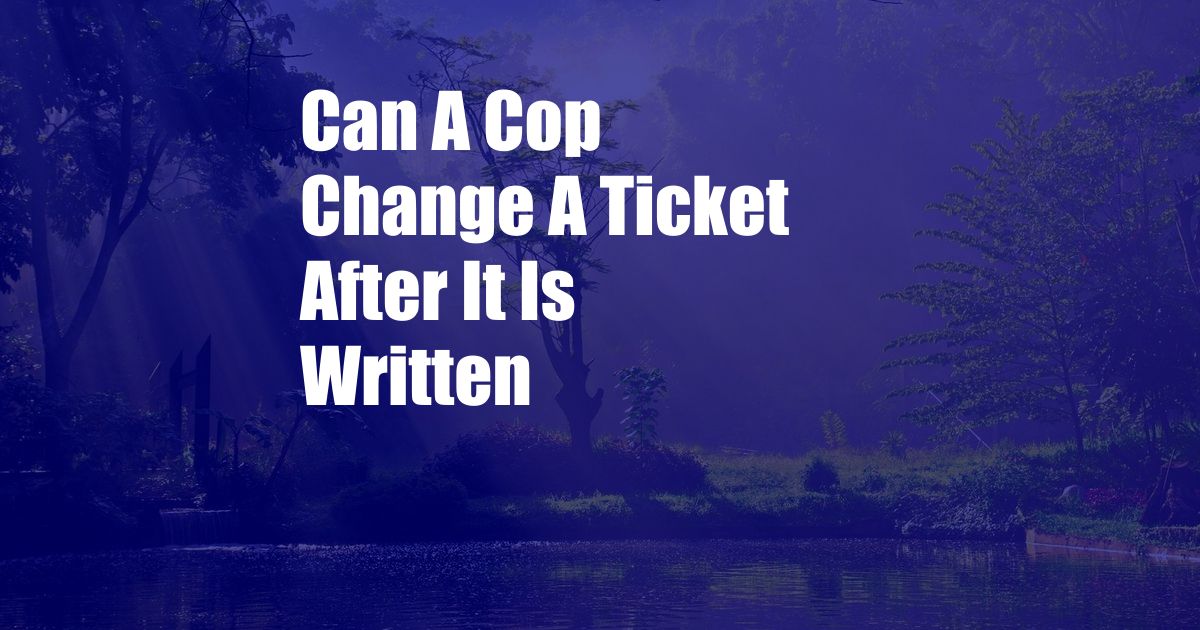
Can a Cop Change a Ticket After It Is Written?
Imagine you are driving home from work, tired and ready to relax. Suddenly, you see flashing lights in your rearview mirror. You pull over, knowing you were speeding, but you were only going 5 mph over the limit. The officer approaches your window and asks for your license and registration. You hand them over, and they return to their car to write you a ticket.
As you wait, you start to think about how this ticket will affect your insurance rates. Maybe you could try to talk to the officer and get them to lower the fine. But as the officer walks back to your car, you realize it’s too late. They’ve already written the ticket, and you’re stuck with the fine. Or are you?
Can a Police Officer Change a Ticket?
In most cases, once a police officer has written and issued a traffic ticket, they cannot change it. The reason for this is that once the ticket is issued, it becomes a legal document. The officer’s signature on the ticket is a sworn statement that the information on the ticket is accurate. If the officer were to change the ticket after it was issued, it would be considered tampering with a legal document, which is a crime.
However, there are some exceptions to this rule. In some cases, the officer may be able to change the ticket if the mistake was made in error. For example, if the officer wrote the wrong license plate number on the ticket, they may be able to correct it. Or, if the officer made a mistake in calculating the fine, they may be able to reduce the amount of the fine.
If you believe that the officer made a mistake on your ticket, you can contact the court and request that the ticket be dismissed or amended. You will need to provide evidence to support your claim, such as a copy of your driver’s license or registration. The court will then review your request and make a decision.
What Should You Do If You Get a Ticket?
If you get a traffic ticket, the first thing you should do is review the ticket carefully. Make sure that the information on the ticket is accurate, and that the officer did not make any mistakes. If you find any errors, you can contact the court and request that the ticket be dismissed or amended.
You should also consider fighting the ticket in court. If you can prove that you were not guilty of the violation, the judge may dismiss the ticket. Or, if you can negotiate with the prosecutor, you may be able to get the fine reduced.
Here are some tips for fighting a traffic ticket:
- Be prepared. Before you go to court, make sure you have all of the necessary documents, such as your driver’s license, registration, and insurance card. You should also be prepared to testify about what happened.
- Be respectful. The judge and prosecutor are not your enemies. They are just doing their jobs. Be respectful of them, and they will be more likely to be respectful of you.
- Be honest. Don’t lie to the judge or prosecutor. If you do, you will only make things worse for yourself.
FAQs About Traffic Tickets
Q: Can I get out of a traffic ticket if I apologize to the officer?
A: Apologizing to the officer may help, but it is not a guarantee that you will get out of the ticket. The officer may still decide to issue you a ticket, regardless of whether you apologize.
Q: What happens if I don’t pay my traffic ticket?
A: If you don’t pay your traffic ticket, the court may issue a warrant for your arrest. You may also be charged with a failure to appear, which is a separate crime.
Q: Can I fight a traffic ticket if I was speeding?
A: Yes, you can fight a traffic ticket even if you were speeding. However, it is important to have a good reason for fighting the ticket, such as if you were not actually speeding or if the officer made a mistake.
Conclusion
If you get a traffic ticket, don’t panic. There are a number of things you can do to fight the ticket or get the fine reduced. By following the tips in this article, you can increase your chances of getting out of a traffic ticket.
Are you interested in learning more about traffic tickets? If so, I encourage you to do some research online or talk to an attorney. There are a number of resources available to help you understand your rights and options when it comes to traffic tickets.